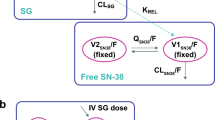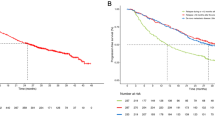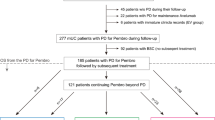Abstract
Purpose: This phase I study explored gefitinib (G) and capecitabine (C) in metastatic breast cancer (MBC). Methods: Sequential cohorts (n = 3) received G and escalating C on a 14 day on/7 day off schedule, with a validation cohort (n = 10) at the maximum tolerated dose (MTD). Dose limiting toxicity (DLT) was defined in cycle 1. The primary endpoint was safety; secondary endpoints included response and adherence. Results: About 19 patients were treated for a median of 5 cycles. No patients in sequential cohorts experienced DLT; C MTD was 2,000 mg/m2/day when paired with daily G 250 mg. In the validation cohort, four experienced serious toxicities, including diarrhea, mucositis, and palmarplantar dysesthesia. At the MTD, 6 (46%) required a C dose reduction, and 3 (23%) came off study for toxicity. One partial response was observed (8%, 95% CI 0.2–38.5%); five had stable disease >24 weeks (26, 95% CI 9–51%). Patients missed few drug doses, with the suggestion of overadherence to therapy. Conclusions: In this phase I study of G and C in MBC, a C MTD was identified, and significant toxicity was observed. About 8% demonstrated a response, with 26% maintaining stable disease. The possibility of overadherence, as suggested in this study, may have implications for other trials of oral antineoplastic therapy.

Similar content being viewed by others
References
Klijn JG, Berns PM, Schmitz PI, Foekens JA (1992) The clinical significance of epidermal growth factor receptor (EGF-R) in human breast cancer: a review on 5,232 patients. Endocr Rev 13:3–17
Busse D, Yakes FM, Lenferink AE, Arteaga CL (2001) Tyrosine kinase inhibitors: rationale, mechanisms of action, and implications for drug resistance. Semin Oncol 28:47–55. doi:10.1016/S0093-7754(01)90282-9
Ciardiello F, Caputo R, Bianco R et al (2000) Antitumor effect and potentiation of cytotoxic drugs activity in human cancer cells by ZD-1839 (Iressa), an epidermal growth factor receptor-selective tyrosine kinase inhibitor. Clin Cancer Res 6:2053–2063
Moulder SL, Yakes FM, Muthuswamy SK et al (2001) Epidermal growth factor receptor (HER1) tyrosine kinase inhibitor ZD1839 (Iressa) inhibits HER2/neu (erbB2)-overexpressing breast cancer cells in vitro and in vivo. Cancer Res 61:8887–8895
Anderson NG, Ahmad T, Chan K et al (2001) ZD1839 (Iressa), a novel epidermal growth factor receptor (EGFR) tyrosine kinase inhibitor, potently inhibits the growth of EGFR-positive cancer cell lines with or without erbB2 overexpression. Int J Cancer 94:774–782. doi:10.1002/ijc.1557
Moasser MM, Basso A, Averbuch SD, Rosen N (2001) The tyrosine kinase inhibitor ZD1839 (“Iressa”) inhibits HER2-driven signaling and suppresses the growth of HER2-overexpressing tumor cells. Cancer Res 61:7184–7188
Nicholson RI, Hutcheson IR, Harper ME et al (2001) Modulation of epidermal growth factor receptor in endocrine-resistant, oestrogen receptor-positive breast cancer. Endocr Relat Cancer 8:175–182. doi:10.1677/erc.0.0080175
Knowlden JM, Hutcheson IR, Jones HE et al (2003) Elevated levels of epidermal growth factor receptor/c-erbB2 heterodimers mediate an autocrine growth regulatory pathway in tamoxifen-resistant MCF-7 cells. Endocrinology 144:1032–1044. doi:10.1210/en.2002-220620
Shou J, Massarweh S, Osborne CK et al (2004) Mechanisms of tamoxifen resistance: increased estrogen receptor-HER2/neu cross-talk in ER/HER2-positive breast cancer. J Natl Cancer Inst 96:926–935
Lu C, Speers C, Zhang Y et al (2003) Effect of epidermal growth factor receptor inhibitor on development of estrogen receptor-negative mammary tumors. J Natl Cancer Inst 95:1825–1833
Baselga J, Rischin D, Ranson M et al (2002) Phase I safety, pharmacokinetic, and pharmacodynamic trial of ZD1839, a selective oral epidermal growth factor receptor tyrosine kinase inhibitor, in patients with five selected solid tumor types. J Clin Oncol 20:4292–4302. doi:10.1200/JCO.2002.03.100
Herbst RS, Maddox AM, Rothenberg ML et al (2002) Selective oral epidermal growth factor receptor tyrosine kinase inhibitor ZD1839 is generally well-tolerated and has activity in non-small-cell lung cancer and other solid tumors: results of a phase I trial. J Clin Oncol 20:3815–3825. doi:10.1200/JCO.2002.03.038
Ranson M, Hammond LA, Ferry D et al (2002) ZD1839, a selective oral epidermal growth factor receptor-tyrosine kinase inhibitor, is well tolerated and active in patients with solid, malignant tumors: results of a phase I trial. J Clin Oncol 20:2240–2250. doi:10.1200/JCO.2002.10.112
Baselga J, Albanell J, Ruiz A et al (2005) Phase II and tumor pharmacodynamic study of gefitinib in patients with advanced breast cancer. J Clin Oncol 23:5323–5333. doi:10.1200/JCO.2005.08.326
Albain KS, Elledge R, Gradishar WJ et al (2002) Open-label, phase II, multicenter trial of ZD1839 (‘Iressa’) in patients with advanced breast cancer. Breast Cancer Res 76:S33 A20
Robertson JFR, Gutteridge E, Cheung KL, et al (2003) Gefitinib (ZD1839) is active in acquired tamoxifen (TAM)-resistant oestrogen receptor (ER)-positive and ER-negative breast cancer: results from a phase II study. J Clin Oncol 22:A23. 2003 ASCO annual meeting proceedings (post-meeting edition)
von Minckwitz G, Jonat W, Fasching P et al (2005) A multicentre phase II study on gefitinib in taxane- and anthracycline-pretreated metastatic breast cancer. Breast Cancer Res Treat 89:165–172. doi:10.1007/s10549-004-1720-2
Blum JL, Dieras V, Lo Russo PM et al (2001) Multicenter, Phase II study of capecitabine in taxane-pretreated metastatic breast carcinoma patients. Cancer 92:1759–1768. doi:10.1002/1097-0142(20011001)92:7<1759::AID-CNCR1691>3.0.CO;2-A
Blum JL, Jones SE, Buzdar AU et al (1999) Multicenter phase II study of capecitabine in paclitaxel-refractory metastatic breast cancer. J Clin Oncol 17:485–493
Talbot DC, Moiseyenko V, Van Belle S et al (2002) Randomised, phase II trial comparing oral capecitabine (Xeloda) with paclitaxel in patients with metastatic/advanced breast cancer pretreated with anthracyclines. Br J Cancer 86:1367–1372. doi:10.1038/sj.bjc.6600261
Fumoleau P, Largillier R, Clippe C et al (2004) Multicentre, phase II study evaluating capecitabine monotherapy in patients with anthracycline- and taxane-pretreated metastatic breast cancer. Eur J Cancer 40:536–542. doi:10.1016/j.ejca.2003.11.007
O’Shaughnessy JA, Blum J, Moiseyenko V et al (2001) Randomized, open-label, phase II trial of oral capecitabine (Xeloda) vs. a reference arm of intravenous CMF (cyclophosphamide, methotrexate and 5-fluorouracil) as first-line therapy for advanced/metastatic breast cancer. Ann Oncol 12:1247–1254. doi:10.1023/A:1012281104865
Magne N, Fischel JL, Dubreuil A et al (2003) ZD1839 (Iressa) modifies the activity of key enzymes linked to fluoropyrimidine activity: rational basis for a new combination therapy with capecitabine. Clin Cancer Res 9:4735–4742
Ouchi KF, Yanagisawa M, Sekiguchi F, Tanaka Y (2006) Antitumor activity of erlotinib in combination with capecitabine in human tumor xenograft models. Cancer Chemother Pharmacol 57:693–702. doi:10.1007/s00280-005-0079-3
Waterhouse DM, Calzone KA, Mele C, Brenner DE (1993) Adherence to oral tamoxifen: a comparison of patient self-report, pill counts, and microelectronic monitoring. J Clin Oncol 11:1189–1197
Traina TA, Theodoulou M, Feigin K et al (2008) Phase I study of a novel capecitabine schedule based on the Norton–Simon mathematical model in patients with metastatic breast cancer. J Clin Oncol 26:1797–1802. doi:10.1200/JCO.2007.13.8388
Gasparini G, Sarmiento R, Amici S et al (2005) Gefitinib (ZD1839) combined with weekly epirubicin in patients with metastatic breast cancer: a phase I study with biological correlate. Ann Oncol 16:1867–1873. doi:10.1093/annonc/mdi393
Fountzilas G, Pectasides D, Kalogera-Fountzila A et al (2005) Paclitaxel and carboplatin as first-line chemotherapy combined with gefitinib (IRESSA) in patients with advanced breast cancer: a phase I/II study conducted by the hellenic cooperative oncology group. Breast Cancer Res Treat 92:1–9. doi:10.1007/s10549-005-0322-y
Ciardiello F, Troiani T, Caputo F et al (2006) Phase II study of gefitinib in combination with docetaxel as first-line therapy in metastatic breast cancer. Br J Cancer 94:1604–1609
Dennison SK, Jacobs SA, Wilson JW et al (2007) A phase II clinical trial of ZD1839 (Iressa) in combination with docetaxel as first-line treatment in patients with advanced breast cancer. Invest New Drugs 25:545–551. doi:10.1007/s10637-007-9055-6
Cristofanilli M, Valero V, Mangalik A et al (2008) A phase II multicenter, double-blind, randomized trial to compare anastrozole plus gefinitib with anastrozole plus placebo in postmenopausal women with hormone receptor-positive (HR+) metastatic breast cancer (MBC). J Clin Oncol 26:A1012. doi:10.1200/JCO.2008.18.0356
Winer E, Cobleigh M, Dickler M, et al (2002) Phase II multicenter study to evaluate the efficacy and safety of Tarceva™ (erlotinib, OSI-774) in women with previously treated locally advanced or metastatic breast cancer. Breast Cancer Res Treat 76:A445. 2002 san antonio breast cancer symposium proceedings (post-meeting edition)
Tan AR, Yang X, Hewitt SM et al (2004) Evaluation of biologic end points and pharmacokinetics in patients with metastatic breast cancer after treatment with erlotinib, an epidermal growth factor receptor tyrosine kinase inhibitor. J Clin Oncol 22:3080–3090. doi:10.1200/JCO.2004.08.189
Giaccone G, Herbst RS, Manegold C et al (2004) Gefitinib in combination with gemcitabine and cisplatin in advanced non-small-cell lung cancer: a phase III trial—INTACT 1. J Clin Oncol 22:777–784. doi:10.1200/JCO.2004.08.001
Herbst RS, Giaccone G, Schiller JH et al (2004) Gefitinib in combination with paclitaxel and carboplatin in advanced non-small-cell lung cancer: a phase III trial—INTACT 2. J Clin Oncol 22:785–794. doi:10.1200/JCO.2004.07.215
Herbst RS, Prager D, Hermann R et al (2005) TRIBUTE: a phase III trial of erlotinib hydrochloride (OSI-774) combined with carboplatin and paclitaxel chemotherapy in advanced non-small-cell lung cancer. J Clin Oncol 23:5892–5899. doi:10.1200/JCO.2005.02.840
Gatzemeier U, Pluzanska A, Szczesna A et al (2007) Phase III study of erlotinib in combination with cisplatin and gemcitabine in advanced non-small-cell lung cancer: the Tarceva Lung Cancer Investigation Trial. J Clin Oncol 25:1545–1552. doi:10.1200/JCO.2005.05.1474
Bailey LR, Janas M, Schmidt K, et al (2004) Evaluation of epidermal growth factor receptor (EGFR) as a predictive marker in patients with non-small-cell lung cancer (NSCLC) receiving first-line gefitinib combined with platinum-based chemotherapy. J Clin Oncol 22:A7013. 2004 ASCO annual meeting proceedings (post-meeting edition)
Polychronis A, Sinnett HD, Hadjiminas D et al (2005) Preoperative gefitinib versus gefitinib and anastrozole in postmenopausal patients with oestrogen-receptor positive and epidermal-growth-factor-receptor-positive primary breast cancer: a double-blind placebo-controlled phase II randomised trial. Lancet Oncol 6:383–391. doi:10.1016/S1470-2045(05)70176-5
Carey L, Rugo H, Marcom P et al (2008) TBCRC 001: EGFR inhibition with cetuximab added to carboplatin in metastatic triple-negative (basal-like) breast cancer. J Clin Oncol 26:A1009
Arpino G, Wiechmann L, Osborne CK, Schiff R (2008) Crosstalk between the estrogen receptor and the HER tyrosine kinase receptor family: molecular mechanism and clinical implications for endocrine therapy resistance. Endocr Rev 29:217–233. doi:10.1210/er.2006-0045
Partridge AH, Avorn J, Wang PS, Winer EP (2002) Adherence to therapy with oral antineoplastic agents. J Natl Cancer Inst 94:652–661
Atkins L, Fallowfield L (2006) Intentional and non-intentional non-adherence to medication amongst breast cancer patients. Eur J Cancer 42:2271–2276. doi:10.1016/j.ejca.2006.03.004
Partridge AH, LaFountain A, Mayer E et al (2008) Adherence to initial adjuvant anastrozole therapy among women with early-stage breast cancer. J Clin Oncol 26:556–562. doi:10.1200/JCO.2007.11.5451
Urquhart J (1991) Compliance and clinical trials. Lancet 337:1224–1225. doi:10.1016/0140-6736(91)92896-A
Lasagna L, Hutt P (1991) Heath care, research and regulatory impact of noncompliance. In: Cramer JA, Spikler BE (eds) Patient compliance in medical practice and clinical trials. Raven Press, New York, pp 393–403 Edition
Leventhal H, Nerenz DR, Leventhal EA et al (1991) The behavioral dynamics of clinical trials. Prev Med 20:132–146. doi:10.1016/0091-7435(91)90014-U
Acknowledgments
We thank AstraZeneca for providing gefitinib and support for the clinical trial.
Author information
Authors and Affiliations
Corresponding author
Rights and permissions
About this article
Cite this article
Mayer, E.L., Partridge, A.H., Harris, L.N. et al. Tolerability of and adherence to combination oral therapy with gefitinib and capecitabine in metastatic breast cancer. Breast Cancer Res Treat 117, 615–623 (2009). https://doi.org/10.1007/s10549-009-0366-5
Received:
Accepted:
Published:
Issue Date:
DOI: https://doi.org/10.1007/s10549-009-0366-5




